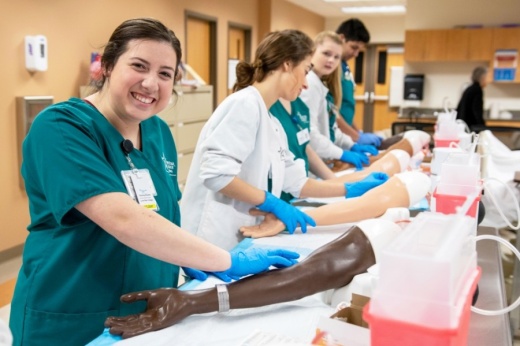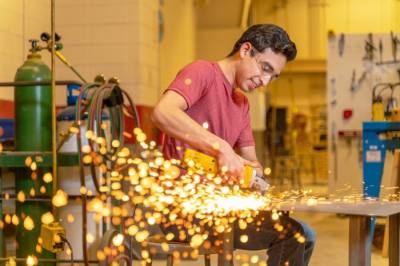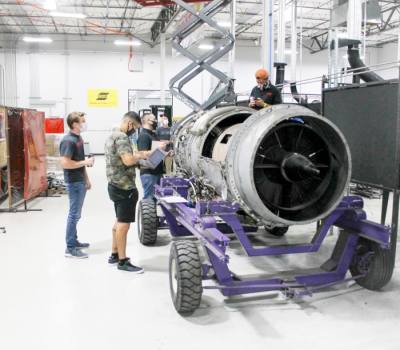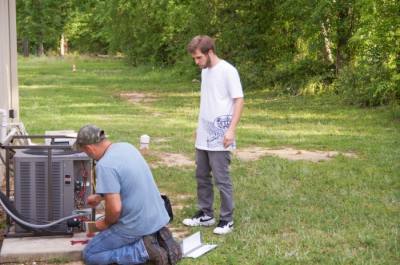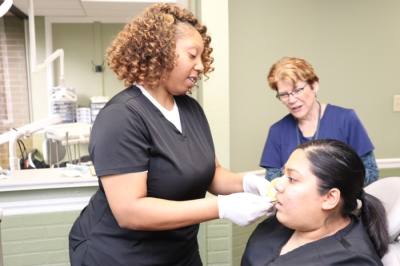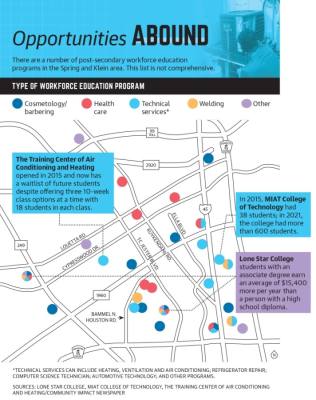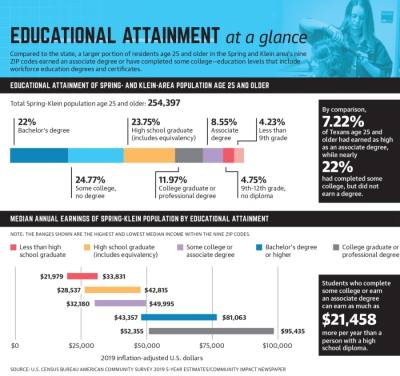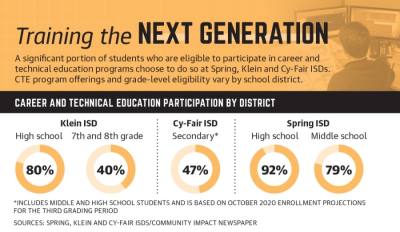As a solution, he decided to close his business and channel his 40 years of experience into educating others. Walters opened The Training Center of Air Conditioning & Heating off Strack Road in 2015.
“We’re making an impact around this area because now, there’s hardly a day that goes by that I don’t get a call from a contractor that says, ‘Hey, I hired one of your students, and now your school is the only place I want to go [to hire employees],’” he said.
Walters’ story is indicative of the recent growth of workforce education programs in the Spring and Klein area. According to the U.S. Census Bureau American Community Survey 2019 five-year estimates, 8.55% of the Spring- and Klein-area population age 25 and older had earned an associate degree, while 24.77% had completed some college but did not earn a degree—both education levels that include workforce education degrees and certificates. By comparison, 7.22% and 22% of Texans had earned associate degrees or completed some college, respectively.
As a ripple effect of the ongoing coronavirus pandemic and subsequent economic downturn, local workforce education program leaders, such as Walters, said their institutions have experienced record enrollments as many students look to transition into “essential work” to become more immune to the economic climate.
“[Getting] a four-year degree, while it may be the right path for some people, it’s not everyone’s path,” said John Willis, president of MIAT College of Technology in Houston.
Located near the intersection of I-45 and East Richey Road, MIAT College of Technology offers programs in aviation maintenance; welding; nondestructive testing; and heating, ventilation, air conditioning and refrigeration.
Meanwhile, career and technical education programs have become more advanced at Spring, Klein and Cy-Fair ISDs with some students beginning their CTE pathway as early as middle school. Program offerings range from cosmetology and nursing to engineering and robotics.
“Modern CTE programs in Klein ISD and even in our neighboring districts are totally different than they were back in the 1980s and 1950s,” KISD CTE Director Deborah Bronner-Westerduin said. “They are truly rigorous and relevant college and career experiences that help students save time and money on the next stage after they leave our doors.”
In February, the Greater Houston area’s unemployment rate was 8.4%—down from 14.2% at the April 2020 peak. However, this figure is still higher than the region’s prepandemic unemployment rate of 3.8% in February 2020, Texas Workforce Commission data shows.
To fill this gap, CTE and workforce education program officials are preparing the next generation for careers in a post-pandemic world.
Building a foundation
To get students ready for the real world—which for some students includes post-secondary workforce education—Spring, Klein and Cy-Fair ISDs offer CTE programs.
Here, students can get hands-on experience in their fields of interest through work-based learning and internships while earning entry-level industry certifications. Students are also able to work toward an associate or bachelor’s degree through dual credit in partnership with the Lone Star College System.
This year, almost 9,000 high school students and 6,000 middle school students are enrolled in CTE programs offered by SISD, according to Lupita Hinojosa, chief of innovation and equity for SISD. Similarly, Bronner-Westerduin said approximately 80% of KISD high school students and 40% of seventh and eighth grade students are enrolled in one of KISD’s nearly 50 CTE pathways, which are offered at all secondary campuses.
In CFISD—the third-largest school district in Texas—about 30,000 students have been enrolled in CTE classes consistently for the past few years, CFISD Chief Academic Officer Linda Macias said.
As about 82% of SISD students are economically disadvantaged, Hinojosa said CTE programs are especially important as they give students a way to financially support themselves while pursuing goals.
“The demand continues to grow because our students, their families and our community all understand the importance of learning skills that can transfer into paid employment,” she said. “This is especially true because many of our students want the option of working while attending higher education, whether it’s to support their families or to help pay tuition bills.”
Bronner-Westerduin said some of KISD’s most popular pathways include robotics, engineering and health sciences with some of the newer pathways being cybersecurity and electrical technology. The district also plans to add a logistics management pathway in the 2022-23 school year.
“Our largest shift in programming has occurred in the last four to five years,” she said. “Everything we do is with the direct mindset of, ‘What can we do to help students prepare for higher education and a wide range of high-skill, high-wage and high-demand future careers?’”
In SISD, Hinojosa said district officials are working with LSC to increase the number of Level I and II certificates and to develop Associate of Applied Science degree options.
SISD’s Associate of Applied Science degree in computer programming will launch in the 2021-22 school year for incoming freshman at the Pathways in Technology Early College High School at Dekaney High School. Known as P-Tech, the new school will allow students to receive curriculum focused on workforce needs and partnerships while obtaining credentials, certificates and an associate degree.
A brave new world
In the Spring and Klein area, there are at least 28 institutions that offer post-secondary workforce education programs, giving students the opportunity to earn industry certifications and associate degrees in a wide array of sectors.
LSC is one of the major local providers of workforce education with two local campuses: University Park and Fallbrook Church. LSC offers workforce education in various sectors, ranging from truck driving and construction to biotechnology and medical assisting.
Linda Head, associate vice chancellor of workforce education and corporate partnerships for the college system, said these programs have become increasingly important as employee expectations have evolved.
“Gone are the days when you had a long time to learn your job and work up in your company,” she said. “Employers want our students to be well skilled and ready to work as soon as they graduate or finish a certification.”
Even within the past year, Head said the job market has changed dramatically as many positions students could get with a four-year liberal arts degree prepandemic are nonexistent today.
“We’re getting students with bachelor’s degrees coming into our workforce education because they can’t find a job in today’s market,” she said.
As a result, Willis said students are seeking out skilled-trade colleges, such as MIAT College of Technology.
Shifting gears
MIAT’s enrollment has grown from 38 students in 2015 to 631 in 2021, Willis said. Between 2019 and 2020, the college gained 93 students—its biggest enrollment year yet, he said.
“Most people are changing careers because they’re either underemployed or unemployed, so they’re looking for something that’s going to make them marketable in the long term regardless of the economic climate,” Willis said.
Similarly, Walters said his program has experienced a surge in enrollment with many new students looking to get out of cyclical sectors such as oil and gas and into more stable careers.
“We have a waiting list now,” he said. “I thought COVID-19 was going to be bad for us, but it actually turned out to be good because ... air conditioning is an essential job.”
In addition to MIAT’s four core programs, Willis said the campus will launch its fifth program, robotics and automation, in June.
“Over the next couple of decades, traditional roles of people working on the assembly line—you’re going to have machines doing that work,” he said. “But there still needs to be someone behind the scenes who is the mechanical programmer of those machines, so that’s where this program comes in.”
Similarly, Head said with the advent of remote learning and working, skills related to information technology and cybersecurity are in high demand. Esports, one of the college’s newer programs available at LSC-Houston North Fallbrook, aligns with this trend, she said.
“Companies like Dell, Verizon and Intel are starting to look for our students to hire instead of waiting until they finish a four-year computer science degree,” she said.




